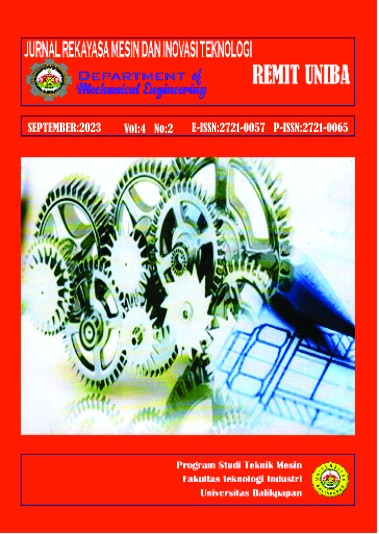Analysis of the Effect of Engine Speeds of 1000, 1500 and 2000 RPM on Heat Transfer in the TOYOTA RUSH 1500 CC Cooling System
Heat Transfer
Keywords:
Radiator, heat transfer, cooling system, effectivenessAbstract
The cooling system in the car functions to reduce the temperature in the engine that occurs as a result of combustion from the combustion chamber. The cooling system on the machine uses a device in the form of a radiator. The problems that will be studied in this study are: Is there an effect of engine speed on heat transfer in the cooling system and how big is the effect of engine speed on heat transfer in the cooling system. The purpose of this study was to determine the effect of engine speed on heat transfer in the Toyota Rush 1500cc cooling system. This study used a research tool, namely the Toyota Rush 1500cc engine and a thermogun. The research was carried out by varying the research time and engine speed, measuring the air temperature before and after hitting the radiator and measuring the temperature of the cooling water before entering and after leaving the radiator. This research method uses descriptive data analysis techniques. Based on the analysis using a graph of the relationship between heat transfer, cooling water temperature and heat transfer as well as effectiveness, that the Radiator Effectiveness value will increase in proportion to the engine speed. Based on the analysis it was concluded that the value of Effectiveness at 5, 10 and 15 minutes was 1.217. 1.889 and 2.030 as well as Heat Transfer increased with increasing engine speed at 5, 10 and 15 minutes the value was 20.379. 25.442 and 29.223 and vice versa, the heat transfer decreases and the effectiveness decreases. In this research, the heat transfer learning system in the Toyota Rush 1500cc engine coolant can be used.
References
A. Syamsudin and Supardi, 2022 “Analisis pengaruh fluida pendingin radiator dan putaran mesin terhadap kapasitas radiator dan efektivitas penyerapan panas Honda mobilio tipe DD4 MT 1.5E,” J.Prosiding Senakama. Vol.1
Astra Motor. 1995 ”New Step I Training Manual,” Jakarta : PT. Toyota Astra Motor.
Astra Motor. 1995 ”New Step II Training Manual,” Jakarta : PT. Toyota Astra Motor.
D. A. D. Hersandi and I. M. Arsana, 2018 “Pengaruh jenis fluida pendinginan terhadap kapasitas radiator pada sistem pendinginan mesin Daihatsu xenia 1300cc,” JPTM, Unif. Negeri Surabaya, Vol.6 No.3, pp. 41-52
D. F. Simamora, F. P. Sappu, T. T. Y. Ulaan, 2014 “Analisis efektivitas radiator pada mesin Toyota kijang 5k,“ J. Online poros Tek. Mesin Universitas Sam Ratulangi Vol.4 No.2
Daryanto. 1995 “Reparasi Sistem Pendingin Mesin Pendingin,” Jakarta : Bumi Aksara.


